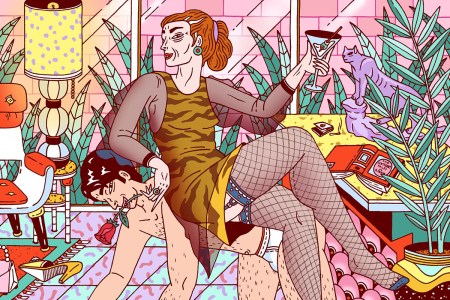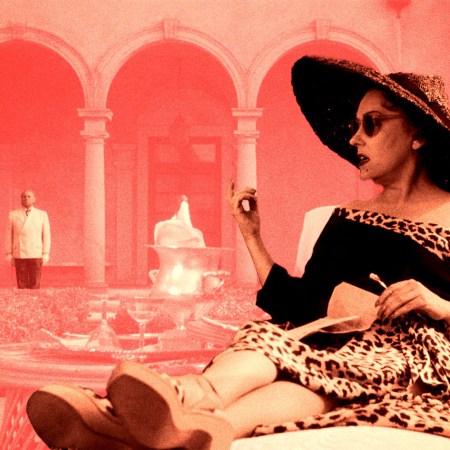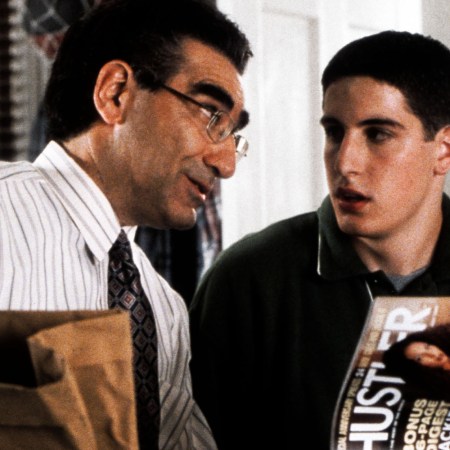All of reality is downstream of 30 Rock, but some things more so than others. A show satirizing the TV industry’s sweaty race to the bottom of the barrel won’t ever be in want of real-world resonance, one case in point being season 2’s in-universe series MILF Island, a lowest-common-denominator unscripted competition promoted with the tagline “25 Super-Hot Moms. 50 Eighth Grade Boys. No Rules.” It’s meant as a parody of the brain-dead programming that had op-ed columnists during the Dubya era pearl-clutching about the decline of Western civilization, and so proudly middlebrow Liz Lemon feels some guilt about her inability to look away from the erotically charged trainwreck. “Wasn’t one of those women a prostitute?” she asks executive Jack Donaghy, the money-minded brain behind the megahit. “That doesn’t mean she’s not a wonderful, caring MILF,” comes his reply.
In this instance, history repeats itself first as farce, then as tragedy. TLC’s new and entirely real MILF Manor plays the gag straight, its existence a rejection of any dissonance between classifying a mother as someone you want to fuck and empathizing with her humanity. Eight cougars between the ages of 40 and 60 have decamped to a lush Mexican villa so they can be fought over by a gaggle of strapping young suitors, and they’ve brought their baggage with them. The show sincerely believes in the desires of adult women, and the producers make an effort to extend this same baseline regard to the struggles obligatory in all reality dating contestants’ backstories. Divorce and death are recurring themes, with bereaved Jersey girl Charlene tearfully declaring that the daughter she lost less than one year earlier would be happy to see her getting ground on by Gen Z beefcakes. There’s a lot of delirious semi-intentional comedy along these lines, but the libidos of the middle-aged are never the tautly-toned butt of the joke. During a truth-telling challenge in week two, the 51-year-old SoYoung reveals that she once slept with her 26-year-old son Jimmy’s best friend, only for Jimmy to counter that he once contracted pinkeye from anilingus. The Learning Channel, indeed!
Oh, right: the thing is that the eight barely legal hunks jockeying for the hands (and other body parts) of the assorted MILFs also happen to be their sons. The antics of both parents and children trying to get laid while simultaneously cockblocking each other make for ripely incestuous spectacle, the minds of couch Freudians racing as Pola reminisces about playing the helicopter game with her infant son while doing the same thing with a prospective lover, or as Kelle teases her eye-rolling offspring Joey that both he and she will soon be addressing one of his contemporaries as “Daddy.” In France, it’s generally presumed that a young person’s interest in an older lover is a sign of a mature intellect seeking a peer, but this is America. Even if consumption of soft incest porn (that’s when the actors append “step-“ to their familial dirty talk) wasn’t at an all-time high in spite of advertiser-appeasing censorship efforts from tube sites, it would be apparent that these boys want their mommies. Or, failing that, someone to call Mommy.
The current cultural supremacy of the MILF — confident, self-possessed, capable, done with the game-playing and other sundry bullshit of her thirties — can be viewed as the equal and opposite reaction to the spike in daddy stuff during the previous decade, giving a broader swath of guys tacit permission to get in on the D and S in BDSM. Though perhaps it would be more accurately pinpointed as the flip side to the ascent of the himbo, part of the same corrective societal shift that favors in-command women to go with the grateful, compliant men. The impulse that previously generated tweets about wanting Rachel Weisz to run you over with her car has trickled down to a broader positivism about letting a grown lady take the wheel. With economic and ecological futures both perilously uncertain, we’ve deferred to the experience and authority of women with the va-va-voom to reframe those qualities as desirable, their air of the matronly repurposed for part of a taboo-teasing bit.
Though a linguistics study in the early ‘90s titled “Bitches and Skanky Hobags: The Place of Women in Contemporary Slang” first noted the use of “MILF” by Californian undergrads, the term was formally defined and popularized in American Pie as a descriptor for Stifler’s mother, then used as a punchline at the expense of Stifler’s mother’s son (that is, Stifler). Feminine yet sturdy, she grants effete loser Eddie Kaye Thomas a mercy-fuck to do away with his virginity, the point less about the mutually nurturing terms of their union than the fainting spell it incites once her boy gets an eyeful. Her stock rising with a lustful, acclaimed turn on The White Lotus, triumphant actress Jennifer Coolidge now drops in on talk shows to reminisce on how much real-world ass that role got her. (Meanwhile, the female lead of the latest film in the Magic Mike franchise, cinema’s proudest demonstration of woman-worship, is a 56-and-gorgeous Salma Hayek Pinault.)
Under George W. Bush, when a 2003 Vanity Fair cover announced that “It’s Totally Raining Teens!” over Hollywood and low-rise jeans teased the public with slivers of nubile hipbones, the United States took a retrograde view of sex appeal to match its conservative values. The closest the zeitgeist got to MILFhood was somebody like mother-of-two Pam Anderson on the mercifully short-lived bookstore sitcom Stacked, playing a hottie with one stiletto-heeled foot planted in self-caricature. On MILF Manor, the look of the cast also hews toward the heavily primped with straightened hair extensions, toasty sunbed tans and augmented breasts all de rigeur. This time around, however, the self-maintenance once read as vanity has been rebranded as enduring beauty through the language of wellness, which bestows a flattering moral valence on being a 10.
The Long and Decorated Literary History of the MILF
From Chaucer to Mrs. Robinson, one of literature’s most subversive archetypes is also a surprisingly old oneSo if our newly conscious consensus dictates that perving out on poreless teens constitutes predatory lechery, then having it bad for a woman on the other end of her sexual prime must necessarily be a virtuous act. As the participants on MILF Manor’s Hulu-produced rival Back in the Groove explain over and over, there’s an irresistible lure to supporting a woman who knows what she wants and what she’s doing. The show’s title (and the scant involvement of heavily-advertised, little-seen executive producer Taye Diggs) nods to How Stella Got Her Groove Back, a crucial text on pre-menopausal sensuality in which undersexed stockbroker Angela Bassett regains her zest for life by bedding a virile adonis half her age. Likewise, the 42-year-old Sparkle has checked into the Groove Hotel at a crossroads of success, having just sold off her unspecified company and looking for her next phase. All three of the women weeding out the crowded field of potential romances offer financial stability along with toned abs, surely a tempting prospect to a generation whose best hope of upward mobility is becoming an influencer (maybe by going on a TV show). Like centuries of trophy spouses before them, they need only keep it tight and provide undying devotion.
In a tidy illustration of the difference between basic cable and premium streaming, Back in the Groove is relatively sane compared to MILF Manor, insofar as there’s only one mother-son duo in an otherwise unrelated cast. But their character dynamics follow many of the same patterns, the physical attraction challenged either by emotional immaturity on his part or mandates for commitment on hers. In the penultimate episode, smooth operator Leroy meets the father of Steph, the woman he’s been courting day and night for weeks. Her dad asks the expected questions about his intentions as far as marriage and children go, and Leroy can only stammer out that he doesn’t have a definite answer, as if he’s never considered these topics before that moment. All televised relationships are manufactured in an encouraging environment (everybody refers to the far-off world outside the show as “reality,” the implication that this genre would be more accurately called unreality TV), and these ones in particular underscore that fragile conditionality, the chemistry curdling into incompatibility the second it’s subjected to any external pressure.
As with all objects of fetishization, the concept of the MILF is preferable to her messy, unsexy actuality, and only as long as the novelty lasts. She’s the woman a twentysomething goes home with for the night, rather than taking her back to his den of post-collegiate squalor. A robust sexuality in the older set adheres to the feel-good ideal of empowerment more cleanly when organized along age brackets, as in the star-studded and altogether appropriate geri-comedy 80 for Brady. All cougars are MILFs, but these MILFs ain’t cougars; though Jane Fonda hums with excitement as she beholds the mighty prow of Rob Gronkowski and Rita Moreno gets in some saucy remarks about taut-tushed NFL superstars, they’re going to wind up in more wholesome, loving pairings with Harry Hamlin and Glynn Turman, respectively. Elsewhere in the Randy Oldsters Cinematic Universe (ROCU), Book Club and its sequel in theaters this May serve up a buffet of weathered masculinity to their New Hollywood icons. Don Johnson and Andy Garcia work the “distinguished” angle better than anyone this side of George Clooney, and what’s more, they show genuine respect for the autonomy of the women who still get a kick out of being a girlfriend.
That’s more than these films can say for themselves. 80 for Brady is pitched at a safe PG-13, allowing for talk about strap-ons and orgasms without forcing anything undignified on its esteemed ensemble. Yet there’s a palpable patronizing remove in how the script fits these characters’ continued sex drive into its instructive depiction of how to maintain an active lifestyle in the twilight years. That film and Book Club both revolve around ritualistic get-togethers giving order and meaning to daily routines short on stimulation, their friendship keeping them from withering. These movies see the pursuit of physical intimacy in the same way, their approval reminiscent of the enthusiasm one might muster upon hearing that their grandmother still power-walks every day and nails the Final Jeoaprdy! clue every night. Their flirtations are cute, but they’re not real, bereft of any heat in a room-temperature atmosphere of dulled pleasantry.
In trading the glut of girlish archetypes for the seasoned MILF, have we simply traded one fantasy for another, reconfiguring the same current of wish fulfillment? Or, to put it more fancifully, does being horny for the right type of woman make a man a better person? It sure did in last year’s Good Luck to You, Leo Grande, the title character a saintly sex worker hired by pre-orgasmic former schoolteacher Nancy so she can see for herself what all the fuss is about. Though she’s initiated the series of hotel room meetups that comprise the stripped-down black-box-style drama, his work mostly entails patiently, politely talking her through the insecurities and self-loathing amassed through decades of a passionless marriage. She’s rude and ignorant at first, point-blank asking him if he’s been trafficked into a waking nightmare of exploited helplessness, which he receives with a beatific smile suggesting that he’s been here before and that it’s all part of the job. He’s the perfect vessel, able to neutralize her discomfort with a seemingly genuine line about finding something to cherish as beautiful in every client paying for his time.
Before long, she starts to see herself that way as well, his divulging of trauma (Mom caught him engaged in group sex with some pals, an oddly precise echo of a similar confession from MILF Manor) leading her to acceptance of body- and sex-positivity. They make what appears to be a meaningful connection beyond the scope of his compensated companionship, though the power differential that draws them in also makes cultivating that bond difficult-to-impossible. Leading lady Emma Thompson concludes the film staring at her disrobed form in the mirror, at peace with her unvarnished, flawed, magnificent nudity. Because Thompson is a superb actress, we can see in her eyes the realization that confidence is sexier than lingerie. She’s just amicably dismissed the smiling Leo, his real name and backstory exposed, his purpose served. She is alone, and feels good.
This article appeared in an InsideHook newsletter. Sign up for free to get more on travel, wellness, style, drinking, and culture.
























